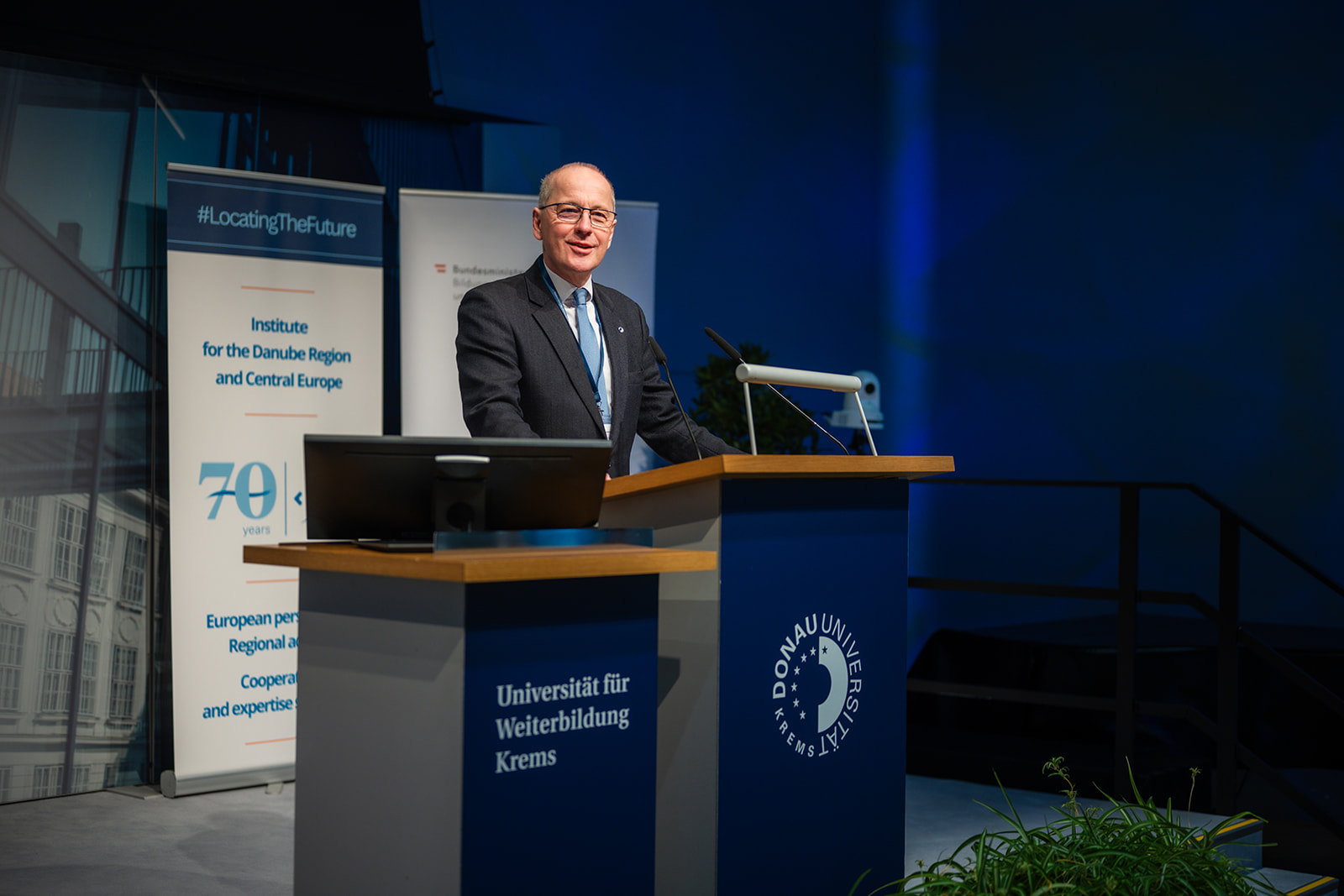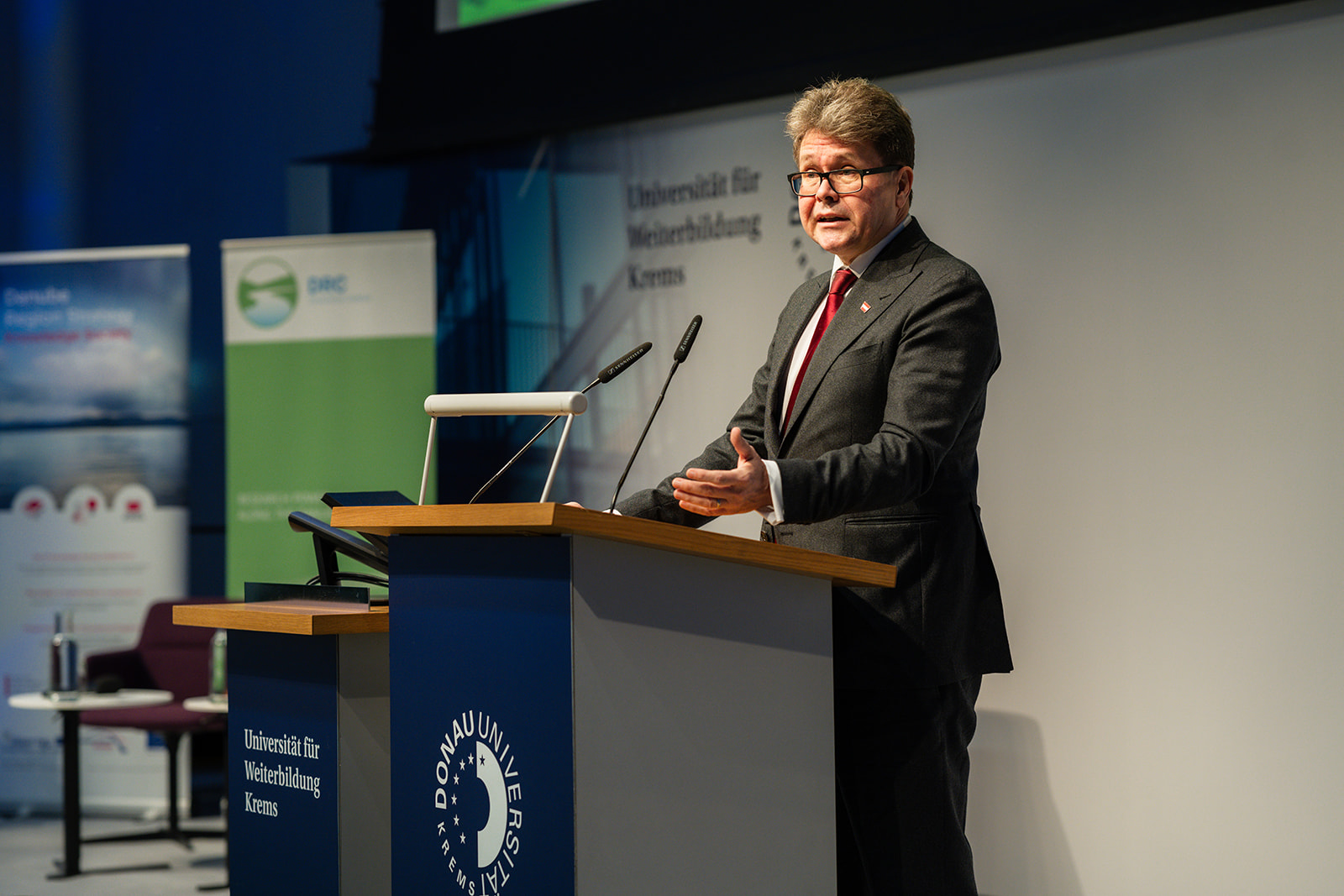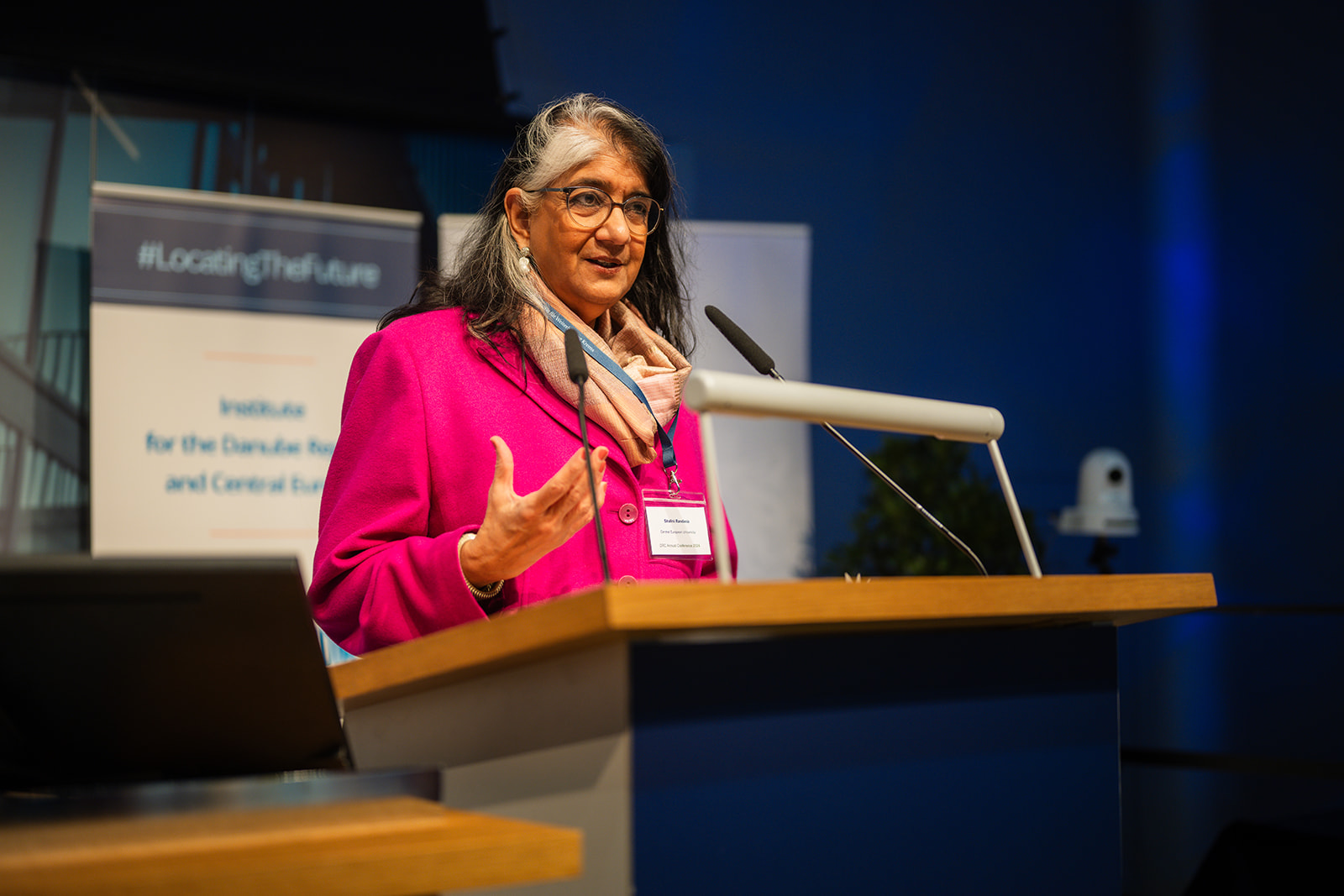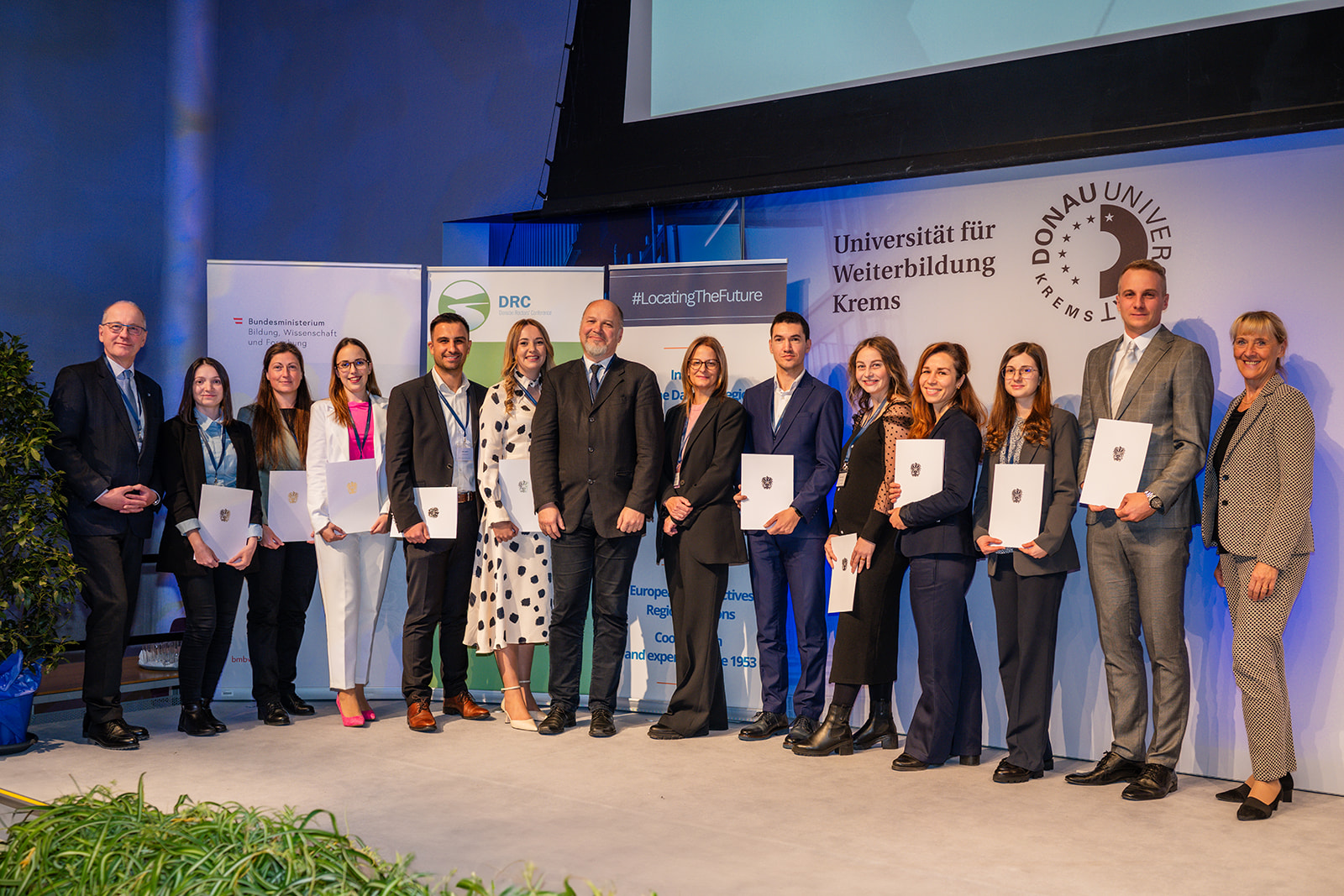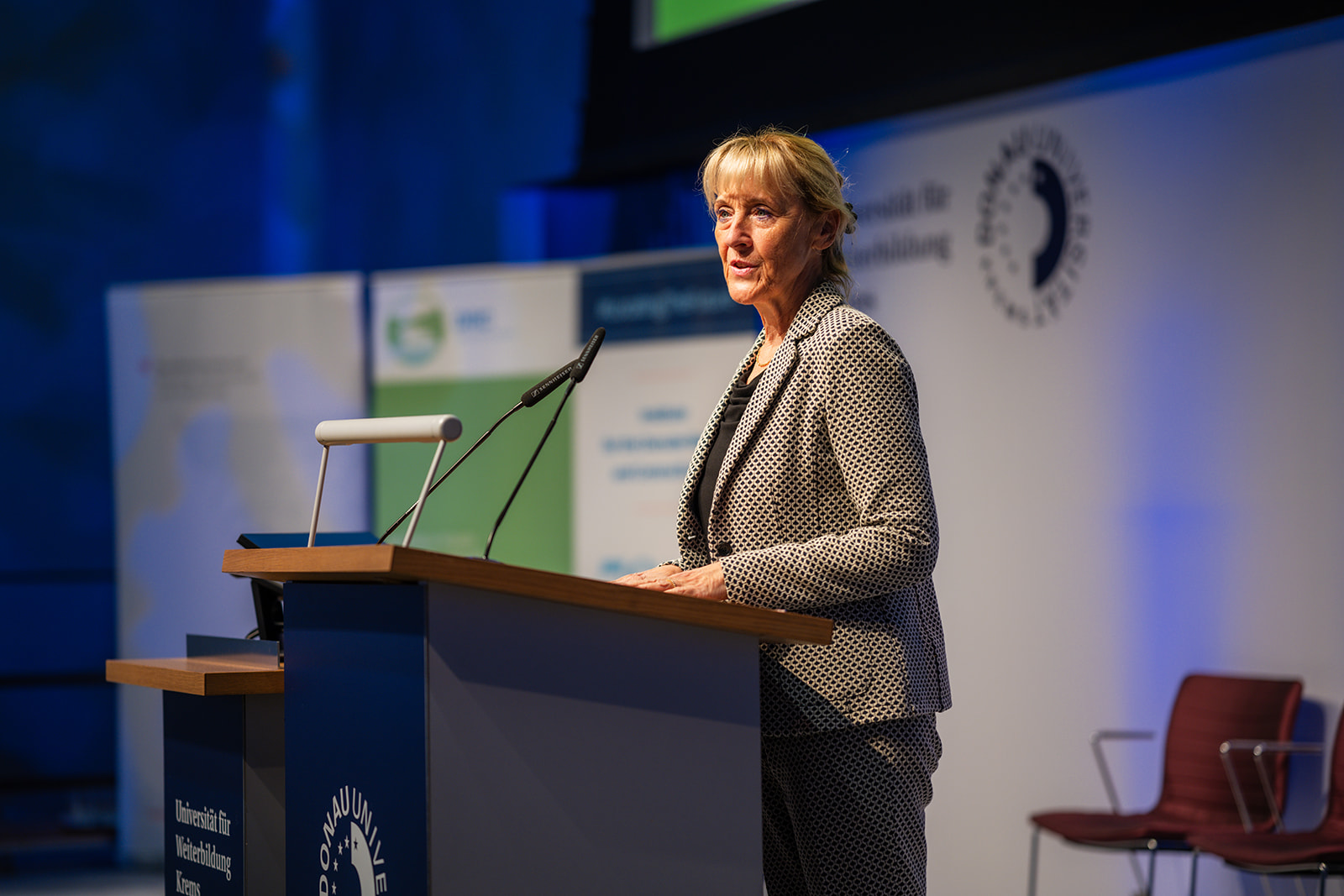The multiple crises of the present and how universities are dealing with them were the focus of the annual meeting of the Danube Rectors' Conference (DRC). Under the title "University Leadership in Times of Uncertainty: Governing Universities in the Danube Region through Multiple Crises", representatives of numerous universities from the Danube region discussed from 13 to 15 November ways to meet societal challenges in a resilient and solution-oriented manner. The Austrian Federal Minister of Education, Science and Research, Martin Polaschek, opened the conference and presented the Danubius Awards 2024 to scientists from the Danube region. In her keynote speech, Shalini Randeria, Rector of the Central European University in Vienna, highlighted the many uncertainties facing universities and their responsibility towards society and, above all, their students.
In his opening remarks, Friedrich Faulhammer, President of the DRC and, as Rector of the University for Continuing Education Krems, host of the conference, emphasized the importance of transdisciplinary thinking at universities in solving the many current crises. He said that sustainable and effective solutions could only arise from the integration of different perspectives. In this context, cooperation with society is crucial. Universities must commit themselves to helping shape the future. Clear and effective governance structures are a prerequisite for success.
Martin Polaschek, Federal Minister of Education, Science and Research, emphasized the role of the Danube Rectors' Conference as a melting pot of ideas and perspectives from the Danube region on the future of higher education in a rapidly changing world. Europe needs a vital cooperation in the field of science to close the innovation gap separating it from other leading scientific powers such as the United States and China. This highlights the importance of the European idea: in a competitive world, no European country can hope to succeed on its own. Only together can the countries play a significant role. The Danube region is a prime example of excellent cooperation. The aim, according to Polaschek, is to build bridges between nations and communities in the face of crises. The DRC supports this by strengthening dialogue and research partnerships between universities, and encouraging exchanges between faculties. Student mobility, in particular, plays a significant role here.
Dealing with uncertainty – CEU rector Randeria gave a keynote speech
Prof. Shalini Randeria, President and Rector of the Central European University (CEU), spoke in her keynote address about the various uncertainties facing universities today. These include growing legal uncertainty, the undermining of democratic and liberal principles, wars, climate change and, last but not least, the aftermath of the pandemic. The war in Ukraine has reintroduced the logic of sovereignty violations, while the climate crisis questions the future as a form of continuity.
The war has brought with it a responsibility for universities to deal with conflicting debates. Should these be value-neutral in Max Weber's sense? Or should they expose themselves politically? The task of universities here, according to Randeria, is to teach students how to think, not what to think. Taking a position ultimately precludes freedom of expression. Universities are one of the few places where public debates on all topics are possible. The decisive factor here is whether debates can be conducted in a respectful atmosphere, in the spirit of academic freedom to express opinions freely, in a civilized and respectful manner. In this context, there is another challenge: disinformation.
To counter all these crises, international cooperation is paramount, as the pandemic in particular has shown, which unfortunately has also given rise to conspiracy thinking and fake news. This also applies to climate change, as well as to the societal understanding of science. Nevertheless, this crisis has proven how important it is to treat knowledge from universities as a global commons.
In the face of so many crises and their manifestations, universities should ask themselves whether they are doing enough to counter them. According to Randeria, universities should constructively deal with the paradox arising from the crises, namely that the more we know, the more uncertainties increase. Knowing more also reveals gaps in knowledge. With regard to students, this means, for example, taking their emotional insecurity caused by the crises seriously and paying attention to their mental health in order to make them resilient. Students should leave university not only as good scientists, but also as responsible citizens.
It is therefore imperative for university governance to act not only at the European level, but internationally as well, to anticipate what is to come, to actively involve society by “reaching out” and to act in solidarity. Drawing on Antonio Gramsci, Randeria concluded by calling for intellectual pessimism, but for an optimism of the will.
EU strategy and leadership
The other sessions of the Rectors' Conference discussed the influence of the EU strategy for the Danube region and its presidencies on the universities in this important European region, as well as the current challenges for leadership through teaching and research, with expert input and high-level participation. The second session was moderated by Attila Pausits, University for Continuing Education Krems, and hosted discussions by Ass. Prof. Pal Danyi, Chair of the Board, Danube Cup Network, Budapest University of Technology and Economics, Gerhard Eisl, Head of Unit, EU macro-regional strategies at the Federal Ministry for European and International Affairs, and Viktor Nedovic, Coordinator Priority Area 7, Serbia. The third session was held with the participation of Iris Rauskala, rector of the University of Applied Sciences Ludwigsburg, and Daniel Breaz, rector of the University of Alba Iulia, Romania, and was moderated by Corinna Geppert from the University for Continuing Education Krems.
Danubius Awards for scientists from the Danube region
At the Danube Rectors' Conference, Federal Minister Martin Polaschek presented the Danubius Award, donated by the Ministry of Science, to scientists from the Danube region. A total of 16 researchers were honored at the Danubius Awards Ceremony 2024 at the University for Continuing Education Krems. Prof. Marek Nekula received the Danubius Award 2024. Ana Pajvančić-Cizelj was honored with the Danubius Mid-Career Award 2024. In addition, 14 young scientists from the Danube region were honored with Danubius Young Scientist Awards.
In cooperation with the Institute for the Danube Region and Central Europe (IDM), the ministry honored young scientific talent from the countries of the Danube region for the eleventh time. The Danubius Young Scientist Award is a prize for young scientists that aims to encourage young scientists to study the Danube and the region from a variety of scientific perspectives.
Contact
Tags
